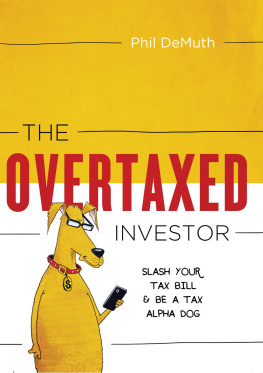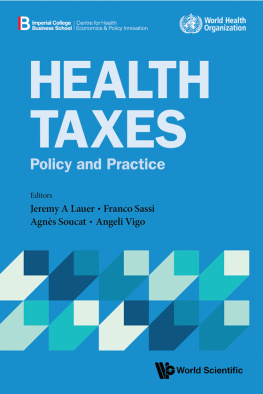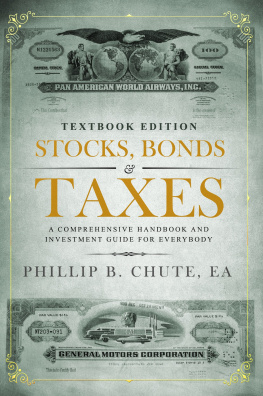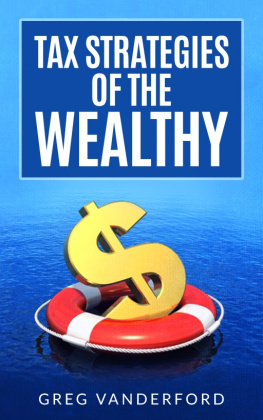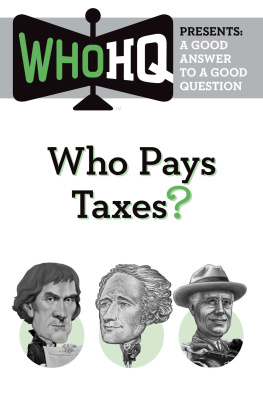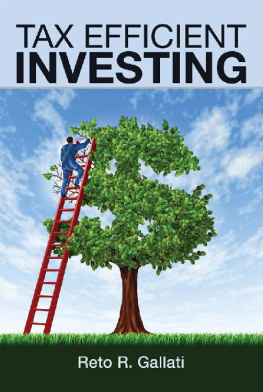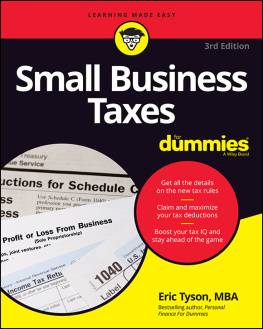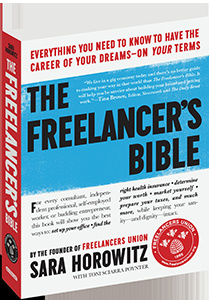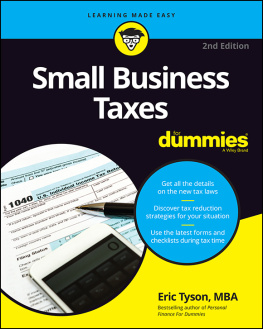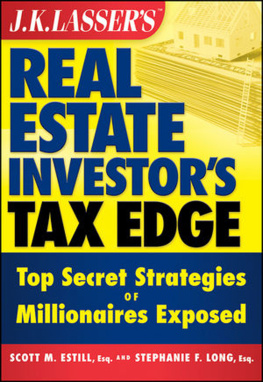Phil DeMuth

Copyright 2016 by Phil DeMuth. All rights reserved.
Published by Alpha Dog Press, Los Angeles, California
All rights reserved. No part of this publication may be reproduced, distributed, or transmitted in any form or by any means, including photocopying, recording, or other electronic or mechanical methods, without the prior written permission of the publisher, except in the case of brief quotations embodied in critical reviews and certain other noncommercial uses permitted by copyright law. For permission requests, contact the author at http://www.phildemuth.com.
This publication contains the authors opinions and is intended to provide accurate and authoritative information of a general nature. It is sold with the understanding that the author and publisher are not engaged in rendering specific legal, accounting, investment planning, or other specific professional advice. Any accounting, legal, financial, business, or tax advice construed from its contents is not intended as a thorough, in-depth analysis of specific issues that can substitute for personalized expert opinion. In all cases the reader should seek the services of qualified professionals for this. The author and publisher cannot be held accountable for any loss incurred as a result of specific investment or planning decisions made by the reader.
First Printing, 2016
Book Design: 1106 Design
Cover illustration by John Caldwell
Publishers Cataloging-in-Publication Data
provided by Five Rainbows Services
Names: DeMuth, Phil, 1950
Title: The overtaxed investor : slash your tax bill & be a tax alpha dog / Phil DeMuth.
Description: Los Angeles : Alpha Dog Press, 2016. | Includes bibliographical references and index.
Identifiers: LCCN 2015919360 | ISBN 978-0-9970596-0-1 (hardcover) |
ISBN 978-0-9970596-1-8 (ebook)
Subjects: LCSH: Tax planning--United States--Popular works. | Finance, Personal--United States. | Investments--Taxation--United States. | Portfolio management. | Tax shelters--United States. | Estate planning--United States.
Classification: KF6415 .D46 2016 (print) | DDC: 336.242/6--dc23.
Printed in the United States of America
10 9 8 7 6 5 4 3 2 1
For my clients:
God bless them, every one!
Preface
Confessions of
a Tax Ignoramus
Suppose you were an idiot. And suppose you were a member of Congress. But then I repeat myself.
MARK TWAIN
I was jawboning on a client call when it hit me like a Buick.
ME: I see you sold a block of company stock last year. You must have paid a pretty penny to the IRS on that one.
JOHN: Actually, no.
ME: No?
JOHN: Well, I just retired. I havent filed for Social Security. Im not tapping my IRA.
ME: Yeah... ?
JOHN: The long-term capital gains were over $100,000, but since Im in the 15% bracket, my tax was zero.
ME: (scales falling from eyes): Great Caesars ghost!
I had no idea a wormhole existed inside the tax code so that someone could pay nothing on a six-figure capital gains distribution. I naively assumed that tax rates were continuous and connected to reality.
I needed to educate myself on this topic, but I could find no readable, up-to-date book on taxes for investors. This left me with no choice but to write the damn thing myself. Believe me, I didnt want to. If you had bothered to write one, it would have saved me a lot of trouble.
My own relationship with the Internal Revenue Service had been one-sided. Every quarter, just as I hoped I might be getting a dollar ahead in this world, they would swoop down and Hoover out my bank account. Like Sisyphus, I resignedly watched the ball roll down Mulholland Drive once more.
My taxes took weeks to compile. I would overnight a steamer trunk to my CPA in early March, and then on April 15 a wooden crate containing my tax returns would arrive at my door via the Panama Canal, full of horrible surprises. In an agonizing annual ritual, I would feverishly write check after check and race to post them by midnight.
My experience was further clouded by having what we laughingly called a family business. Although it invariably failed to make any money, it did a terrific job of generating billable hours for accountants and attorneys. My tax return was the size of a phone book and had to be filed in four states. I struggled to make sense of it, only to be defeated by the debilitating K-1 partnership schedules. I was licked.
Then we offloaded the business. The impenetrable K-1 schedules disappeared. It was just me and my svelte little Form 1040. For once I could see how the gears worked, like looking into a childs mechanical toy.
What instantly became clear was that my own taxes were far from optimalespecially the taxes on my investments, my supposed area of expertise. These had seemed like small change at the time because they were swamped by all the other charges, but now with the blinkers off, I saw how I was generating beaucoup de taxable income that I didnt need or want. I also saw how this same problem was hitting people like my clients the hardest: high-net-worth types who lived in high-tax states like New York, California, New Jersey, Oregon, Minnesota, New Jersey, Vermont, Maryland, and so on. These are high investment tax states, which are not necessarily the same as the high income tax states. But I anticipate... The point is, a lot of people are paying far too much in taxes on their investments.
The solution came like a blinding beam of pure celestial white light. It wasnt newWarren Buffett had been practicing it for years. But it was new to me. I can assure you that it is scarcely practiced at all within the investment advisory community, but maybe it should be practiced by you.
The topic seemed especially relevant for retirees, present and future. The government has been attacking their savings with a two-pronged fork of late. First, in response to the Great Recession, a zero interest rate policy was implemented to pry seniors out of their savings accounts with a crow bar. Then, as seniors are forced to seek interest income more aggressively, it gets taxed heavily. In our low-return world, the impact of taxes is keenly felt. Retirees need to pare this tax bill down to the legal minimum requirement.
Along the way, I discovered that many investors could significantly increase their after-tax returns by following a few sensible rules: buying the right kinds of investments, putting them in the right kinds of accounts, and then following the right drawdown strategy during retirement. There are right and wrong answers to these questions that can raise your standard of living. The solutions are nonobvious. Most people are doing it wrong. This is just shoveling money to the Feds.
The Orwellian American Taxpayer Relief Act of 2012 provided this relief by scrapping the low Bush tax rates and installing the new high Obama tax rates. Any more relief and it would have killed us. Because it is here to stay, it makes comprehensive tax planning possible for the first time in a decade, and because the new rates are so high, it also makes tax planning necessary. It is time to take stock. Perhaps, like me, you have a vague sense that your taxes are not optimal, that you are spitballing and paying too much.
A few things before we dive in:
- I am not a CPA or a tax attorney. Your situation is unique, and the tax code is a shapeshifting death eater. I am going to focus on fundamentals. It is amazing how often twenty journal articles of gobbledygook can be reduced to a few straightforward rules of thumb that cover 99% of the cases. While this book contains tactics and strategies, you will have to figure out how they apply to you. Be guided by your own counselors. If you only listen to me, you will probably get into a peck of trouble.
Next page
